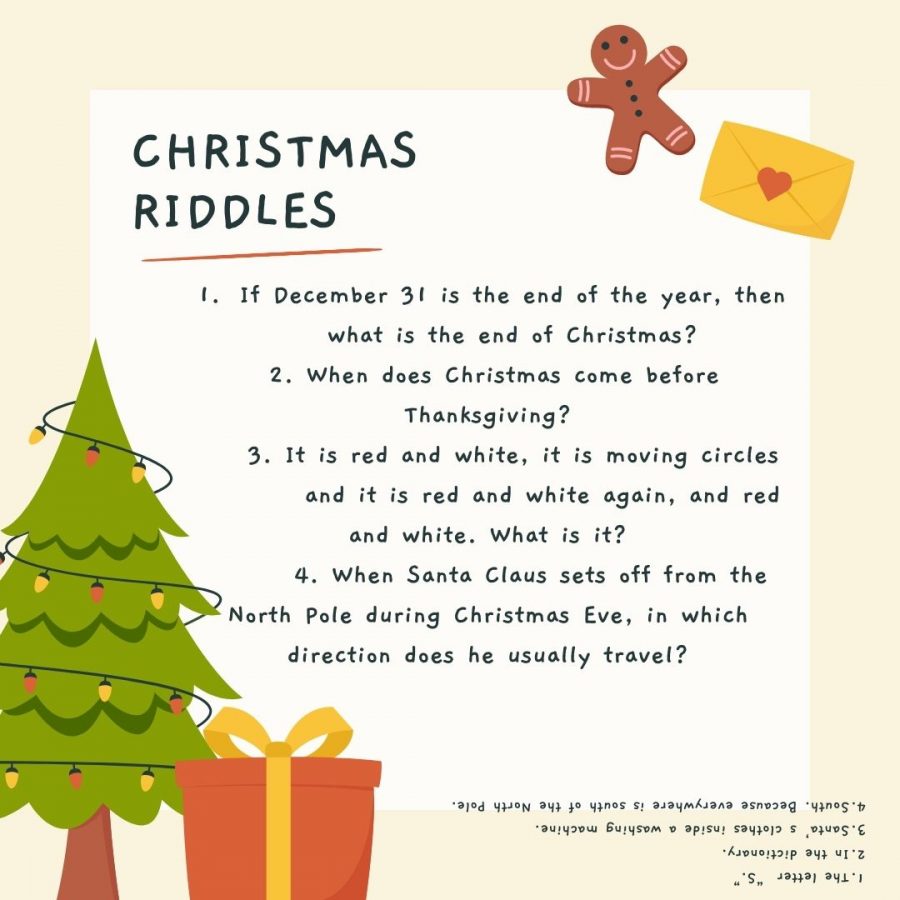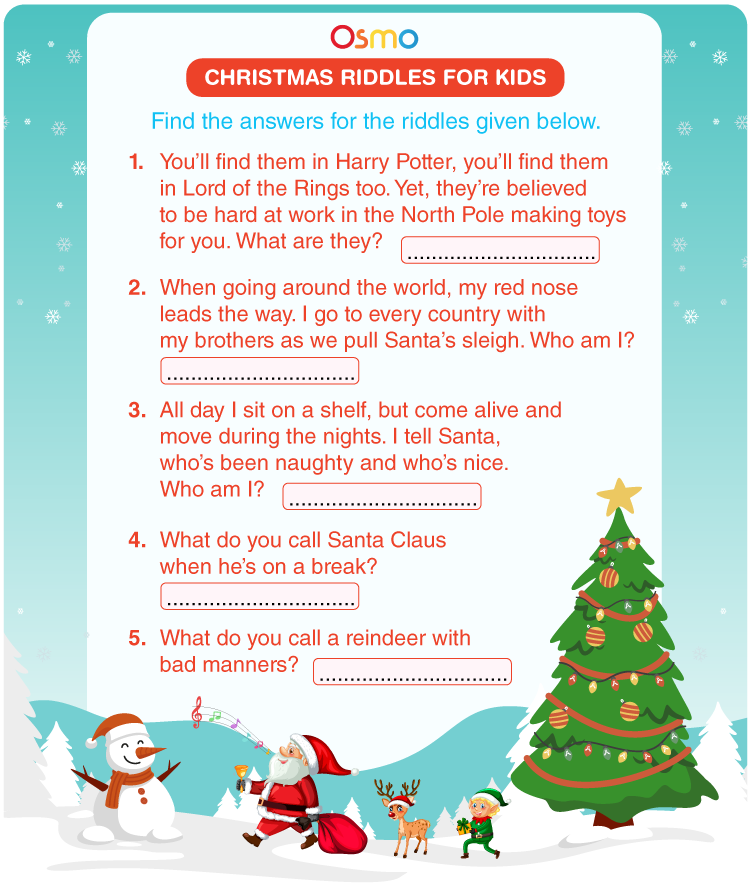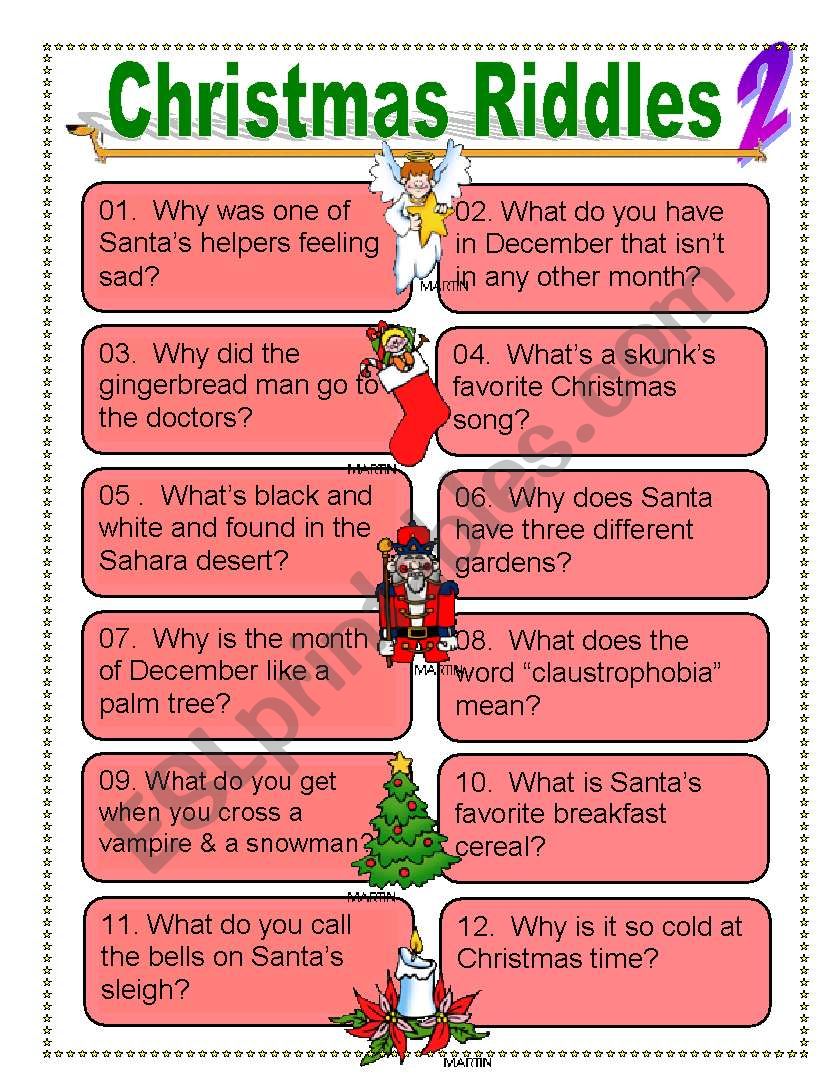The Art Of Festive Enigma: Exploring The World Of Short Christmas Riddles
The Art of Festive Enigma: Exploring the World of Short Christmas Riddles
Related Articles: The Art of Festive Enigma: Exploring the World of Short Christmas Riddles
Introduction
In this auspicious occasion, we are delighted to delve into the intriguing topic related to The Art of Festive Enigma: Exploring the World of Short Christmas Riddles. Let’s weave interesting information and offer fresh perspectives to the readers.
Table of Content
The Art of Festive Enigma: Exploring the World of Short Christmas Riddles

Christmas, a time of joy, togetherness, and merriment, also presents an opportunity for intellectual engagement through the age-old tradition of riddles. Short Christmas riddles, in particular, offer a unique blend of festive cheer and mental stimulation, captivating audiences of all ages. These concise puzzles, often wrapped in a whimsical Christmas theme, challenge participants to decipher hidden meanings and unlock the secrets within.
Understanding the Appeal of Short Christmas Riddles:
The allure of short Christmas riddles lies in their accessibility and engaging nature. They are concise, making them easily digestible and memorable. The festive context adds a layer of warmth and familiarity, making the experience more enjoyable. Moreover, the challenge inherent in solving riddles provides a sense of accomplishment and satisfaction, fostering a sense of festive camaraderie.
The Mechanics of Short Christmas Riddles:
Short Christmas riddles typically follow a specific structure:
- The Question: A concise question or statement that sets the stage for the riddle.
- The Clue: A cryptic hint or description that points towards the answer.
- The Answer: The solution to the riddle, often related to Christmas traditions, symbols, or figures.
Examples of Short Christmas Riddles:
-
Riddle: I am always coming but never arrive. What am I?
Answer: Christmas. -
Riddle: I have branches, but no leaves. What am I?
Answer: A Christmas tree. -
Riddle: I am red and white, and I come in a stocking. What am I?
Answer: A candy cane.
Benefits of Engaging with Short Christmas Riddles:
Beyond their entertainment value, short Christmas riddles offer several cognitive benefits:
- Enhanced Critical Thinking: Solving riddles requires careful analysis of clues and the ability to think outside the box.
- Improved Problem-Solving Skills: Riddles encourage participants to approach problems systematically and creatively.
- Vocabulary Expansion: Exposure to a variety of words and phrases can expand vocabulary and enhance language skills.
- Memory Enhancement: Remembering the riddles and their answers can improve memory retention and recall.
- Fostering a Sense of Community: Sharing and solving riddles together can strengthen bonds and create a sense of shared joy.
FAQs Regarding Short Christmas Riddles:
Q: What are some tips for creating effective short Christmas riddles?
A:
- Keep it Concise: Riddles should be short and to the point, avoiding unnecessary details.
- Focus on the Theme: Riddles should be clearly related to Christmas and its traditions.
- Use Wordplay: Employ puns, metaphors, and other wordplay techniques to add intrigue.
- Consider the Audience: Tailor the difficulty level and language to the age and understanding of the intended audience.
Q: How can short Christmas riddles be used in educational settings?
A:
- Engaging Language Learning: Riddles can be used to introduce new vocabulary and practice language skills.
- Creative Writing Activities: Riddles can inspire creative writing exercises and encourage students to think critically.
- Problem-Solving Exercises: Riddles can be incorporated into problem-solving activities, developing critical thinking skills.
Q: Are there any resources available for finding short Christmas riddles?
A:
- Online Resources: Numerous websites and online databases offer a wide range of Christmas riddles.
- Books: Various books dedicated to riddles and puzzles include sections on Christmas riddles.
- Festive Publications: Magazines and newspapers often feature Christmas-themed puzzles and riddles during the holiday season.
Conclusion:
Short Christmas riddles are a delightful and enriching activity that blends festive cheer with intellectual stimulation. They provide a unique opportunity to engage in critical thinking, problem-solving, and vocabulary expansion while fostering a sense of community and holiday spirit. Whether used for entertainment, education, or simply to add a touch of festive magic to the holiday season, these concise puzzles continue to captivate audiences and inspire a sense of wonder and joy.








Closure
Thus, we hope this article has provided valuable insights into The Art of Festive Enigma: Exploring the World of Short Christmas Riddles. We hope you find this article informative and beneficial. See you in our next article!